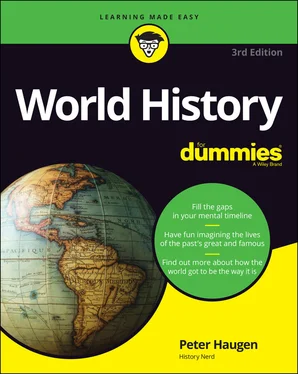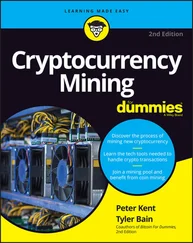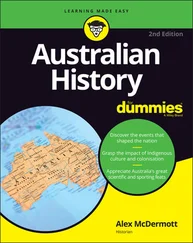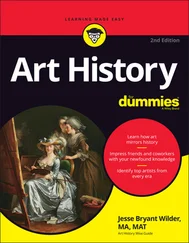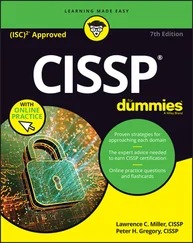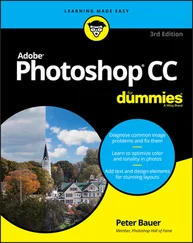Peter Haugen - World History For Dummies
Здесь есть возможность читать онлайн «Peter Haugen - World History For Dummies» — ознакомительный отрывок электронной книги совершенно бесплатно, а после прочтения отрывка купить полную версию. В некоторых случаях можно слушать аудио, скачать через торрент в формате fb2 и присутствует краткое содержание. Жанр: unrecognised, на английском языке. Описание произведения, (предисловие) а так же отзывы посетителей доступны на портале библиотеки ЛибКат.
- Название:World History For Dummies
- Автор:
- Жанр:
- Год:неизвестен
- ISBN:нет данных
- Рейтинг книги:3 / 5. Голосов: 1
-
Избранное:Добавить в избранное
- Отзывы:
-
Ваша оценка:
- 60
- 1
- 2
- 3
- 4
- 5
World History For Dummies: краткое содержание, описание и аннотация
Предлагаем к чтению аннотацию, описание, краткое содержание или предисловие (зависит от того, что написал сам автор книги «World History For Dummies»). Если вы не нашли необходимую информацию о книге — напишите в комментариях, мы постараемся отыскать её.
World History For Dummies,
For Dummies
World History For Dummies
World History For Dummies — читать онлайн ознакомительный отрывок
Ниже представлен текст книги, разбитый по страницам. Система сохранения места последней прочитанной страницы, позволяет с удобством читать онлайн бесплатно книгу «World History For Dummies», без необходимости каждый раз заново искать на чём Вы остановились. Поставьте закладку, и сможете в любой момент перейти на страницу, на которой закончили чтение.
Интервал:
Закладка:
Weaving home
The German Empire was a successor to the Holy Roman Empire. Not to be confused with the earlier Roman Empire, the Holy Roman Empire was a union of Central European territories dating back to Otto the Great in 962 AD. It was considered to be a continuation of the Frankish Empire, established in 800 AD, when Pope Leo III crowned Charlemagne Emperor of the West — essentially naming him the successor to the Roman emperors going back to Augustus, whose rule began in 27 BC.
Follow Leo’s popish thread, and you’ll get to Pope Urban II, who in 1095 called upon Europe’s Christians to make war against the Turks, especially the Seljuk Dynasty, who controlled the city of Jerusalem and the land surrounding it, considered to be the Christian Holy Land.
Urban’s war became the First Crusade, followed by at least nine more crusades over several centuries in which Christians from Europe traveled east to conquer territory in western Asia. Not surprisingly, these incursions contributed to enduring hard feelings on the part of many Muslims toward Christians and the West.
You may trace a thread between the Crusades and latter-day anti-U.S. sentiments, such as those held by the notorious terrorist organization called ISIS, for the Islamic State of Iraq and Syria. (Confusingly, it’s also called IS, ISIL [for Islamic State of Iraq and the Levant], and Daesh.) That thread also crosses the one in which the United Nations partitioned what had been British Palestine (another post-WWI territory) into Arab and Jewish areas to make way for the modern nation of Israel.
Before the rise of ISIS, another terrorist group, al-Qaeda, attacked the United States on September 11, 2001. The American response was a War on Terror(ism) that included the invasion of Afghanistan, where the leaders of al-Qaeda were supposedly hiding, and then the invasion of Iraq, whose leader was thought to be hiding banned weapons and aiding terrorist groups. That second invasion and war destabilized Iraq for many years, giving ISIS a place to form and grow. And I’m back where I started.
Making the Connections
If you’re not thrilled with the tapestry analogy, how about the notion of six degrees of separation, also known as “six degrees of Kevin Bacon” when applied to entertainment figures. The idea is that anybody on Earth can be linked to anybody else in six or fewer interactions. Depending on which interpretation of this idea you like, the interaction could be as simple as a shared acquaintance or a handshake. Some people call it an urban legend, but a few researchers have tried to test the notion, with mixed results.
The game calls for making the connection in six steps or less. Let’s see whether I can do that with Alexander the Great, who died in ancient Babylon, and the Iraq War that started in 2003.
1 Alexander’s conquests spread Greek influence around the Mediterranean Sea.
2 Romans embraced aspects of Greek religion and philosophy.
3 The Roman Empire eventually adopted Christianity.
4 The Roman Catholic Church preserved ancient writings containing classical (Greek and Roman) ideas through the Middle Ages.
5 Christian scholars rediscovered Greek philosophy, sparking the Renaissance.
Oops. Darn. I’m not there yet.
So historical connections aren’t as easy to make as movie-actor connections, but I was on my way. See, the Renaissance led to the Enlightenment, when ideas such as government by consent of the governed took hold. That period led to the American Revolution and modern democracies — the style of government that George W. Bush said he would establish in the Middle East after getting rid of Saddam Hussein by invading Iraq, which helped make room in Iraq and Syria for the rise of ISIS. That’s more than six steps, but not bad.
 If you fill in enough steps and make enough connections, you’ll begin to see the interconnectedness of virtually everything people do on Earth. Maybe once upon a time, a band of hunter-gatherers in what would later be Yemen or Thailand could live for 1,000 years in ignorance of the rest of the world, and no other band of hunter-gatherers anywhere would have known that those prehistoric Yemeni or Thai people existed. But that moment is long gone. Delve into any bit of humankind’s story now, and you’re on a path that reaches far beyond whatever city or village you started in. Each path branches into countless others that together reach around the world and stretch through time to what came before. Everything that ever happened, somebody once said, is still happening. History is now.
If you fill in enough steps and make enough connections, you’ll begin to see the interconnectedness of virtually everything people do on Earth. Maybe once upon a time, a band of hunter-gatherers in what would later be Yemen or Thailand could live for 1,000 years in ignorance of the rest of the world, and no other band of hunter-gatherers anywhere would have known that those prehistoric Yemeni or Thai people existed. But that moment is long gone. Delve into any bit of humankind’s story now, and you’re on a path that reaches far beyond whatever city or village you started in. Each path branches into countless others that together reach around the world and stretch through time to what came before. Everything that ever happened, somebody once said, is still happening. History is now.
Tracking the Centuries
Before 12,000 BC:The Pleistocene Epoch, known today as the last major Ice Age, ends after ice sheets recede northward.
Perhaps 10,000 BC:Agricultural societies develop in an area called the Fertile Crescent in the Middle East.
About 2400 BC:The town of Babylon, between the Tigris and Euphrates Rivers, has grown into a city.
About 323 BC:Alexander the Great dies of a fever in the ancient city of Babylon.
27 BC:Augustus becomes the first Roman emperor.
962 AD:Otto the Great is crowned Holy Roman Emperor in Aix-la-Chapelle, Germany.
1535:Ottoman Turks conquer Baghdad.
1919:The Treaty of Versailles sets out terms of peace to officially end WWI.
1932:The Kingdom of Iraq wins its independence from British rule.
1947:The United Nations partitions what had been British Palestine into Jewish and Arab areas.
1965:The United States escalates its involvement in the Vietnam War by sending troops to fight on the side of the South Vietnamese government.
2001:Nineteen suicide terrorists hijack four commercial airlines and succeed in crashing two of them into New York City’s World Trade Center and a third into the Pentagon in Washington, D.C. The fourth plane crashes in Pennsylvania.
2003:The United States and the United Kingdom, along with small contingents of troops from other allied countries, invade Iraq.
2016:The United Kingdom votes in a referendum to separate from the European Union, a move known as Brexit.
2019:A previously unknown viral illness called COVID-19, arises in China, on its way to becoming the fastest-spreading pandemic the world has yet seen.
2021:President Joe Biden withdraws American troops from Afghanistan.
Chapter 2
Digging Up Reality
IN THIS CHAPTER
 Unearthing long-lost legendary cities
Unearthing long-lost legendary cities
 Spawning myth or reality: Plato’s Atlantis
Spawning myth or reality: Plato’s Atlantis
 Connecting with the past in the form of preserved bodies
Connecting with the past in the form of preserved bodies
If you think of history as lists of facts, dates, battles, and key civilizations, you may memorize a lot, but you’ll never experience the thrill of the past. If, on the other hand, you’re able to make the leap to identify with people who are long dead and to imagine what their lives must have been like, you may be among those for whom the past becomes a passion — and perhaps even an addiction.
Читать дальшеИнтервал:
Закладка:
Похожие книги на «World History For Dummies»
Представляем Вашему вниманию похожие книги на «World History For Dummies» списком для выбора. Мы отобрали схожую по названию и смыслу литературу в надежде предоставить читателям больше вариантов отыскать новые, интересные, ещё непрочитанные произведения.
Обсуждение, отзывы о книге «World History For Dummies» и просто собственные мнения читателей. Оставьте ваши комментарии, напишите, что Вы думаете о произведении, его смысле или главных героях. Укажите что конкретно понравилось, а что нет, и почему Вы так считаете.
